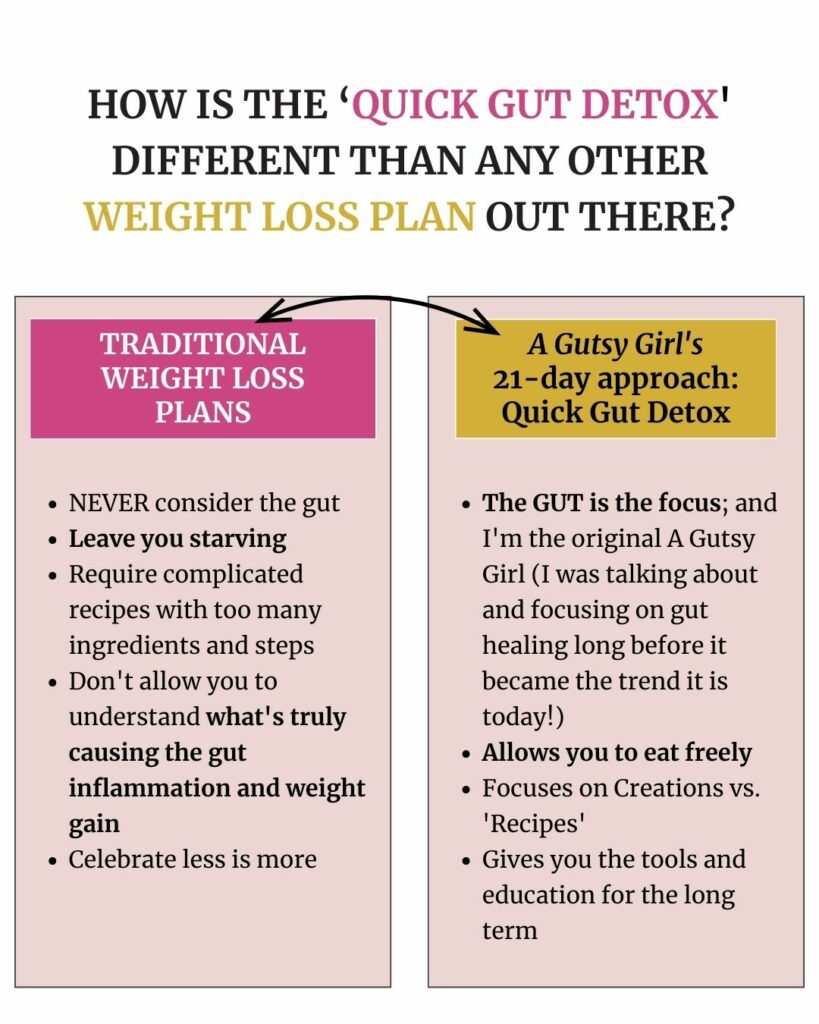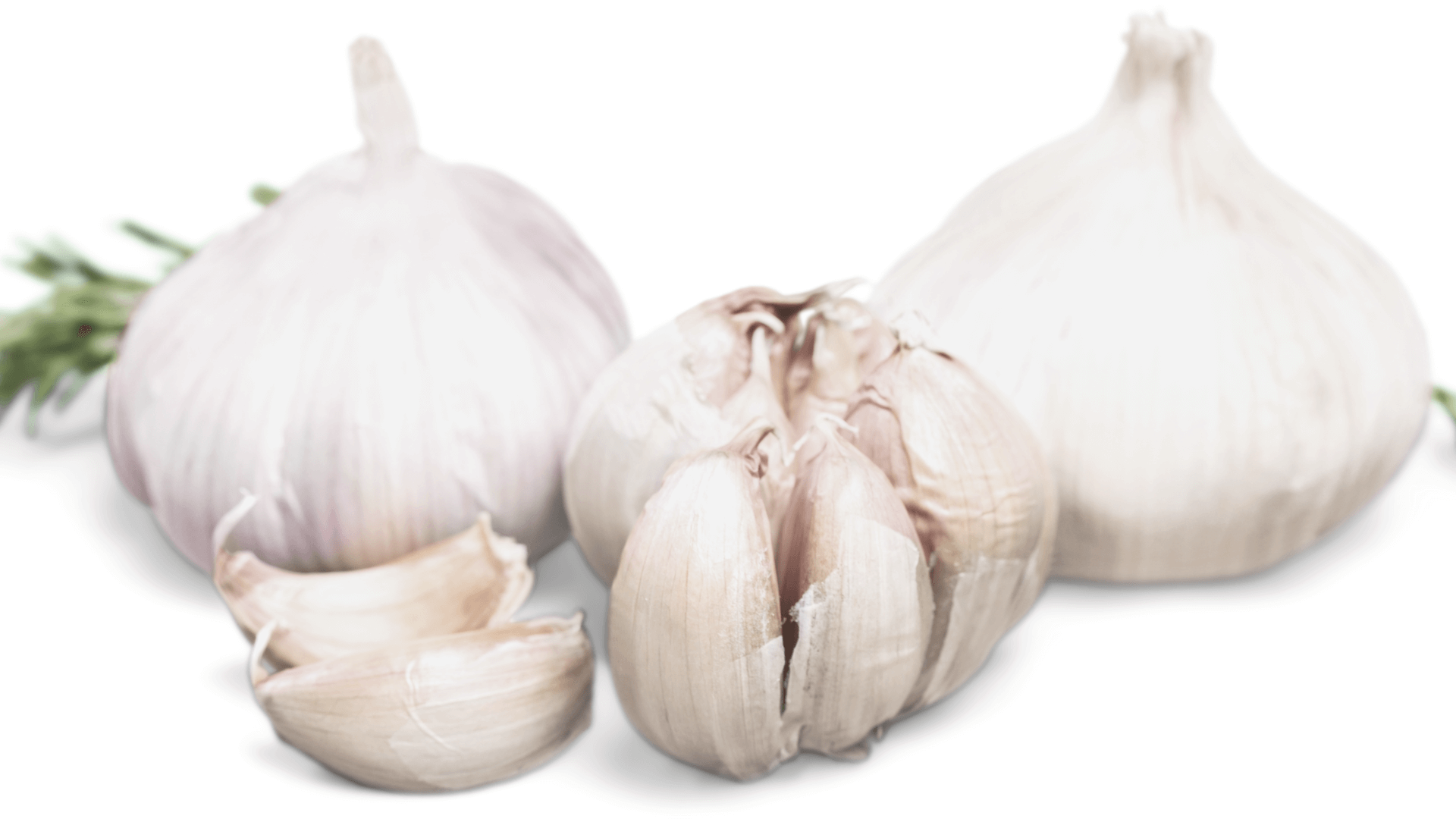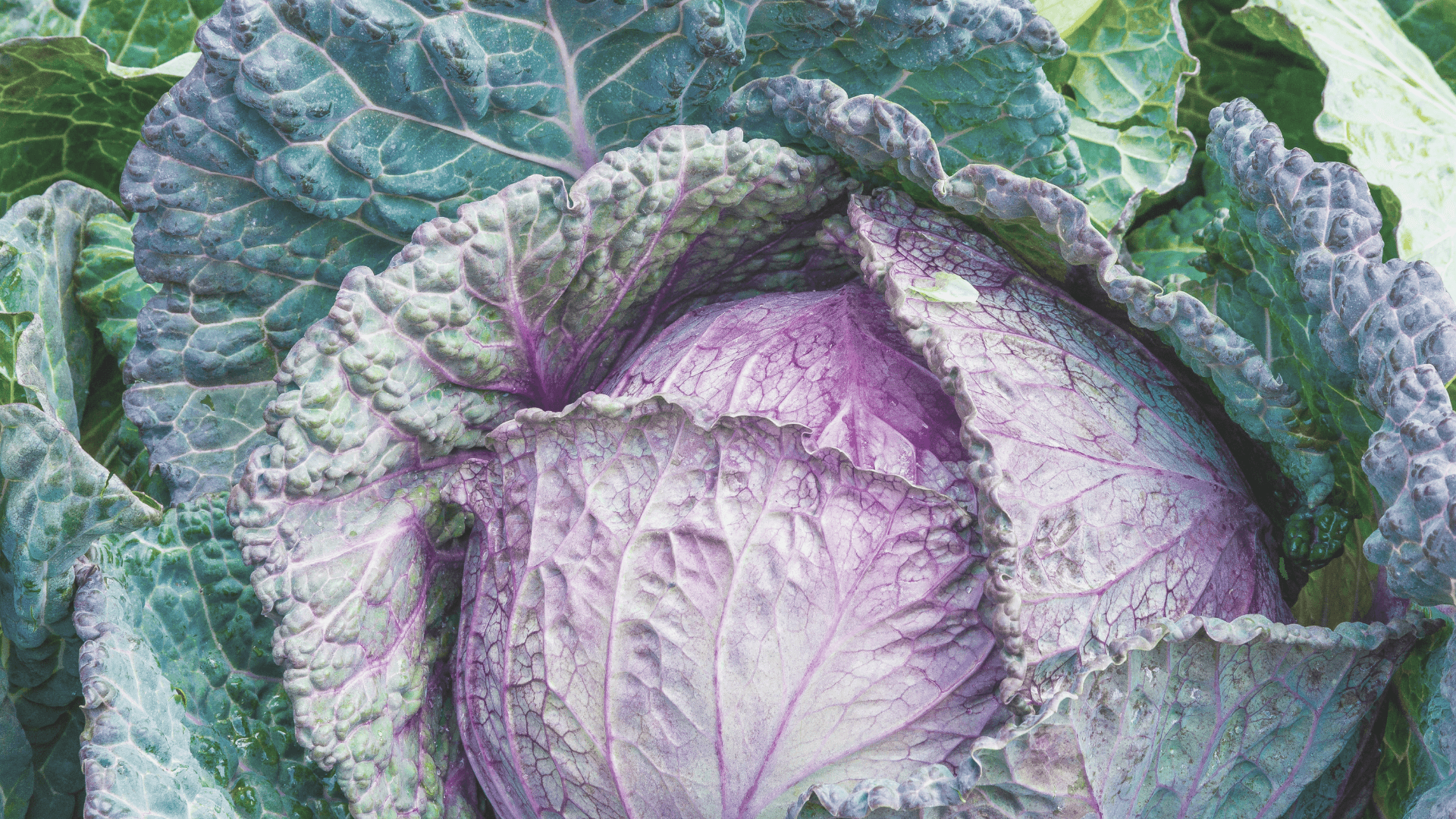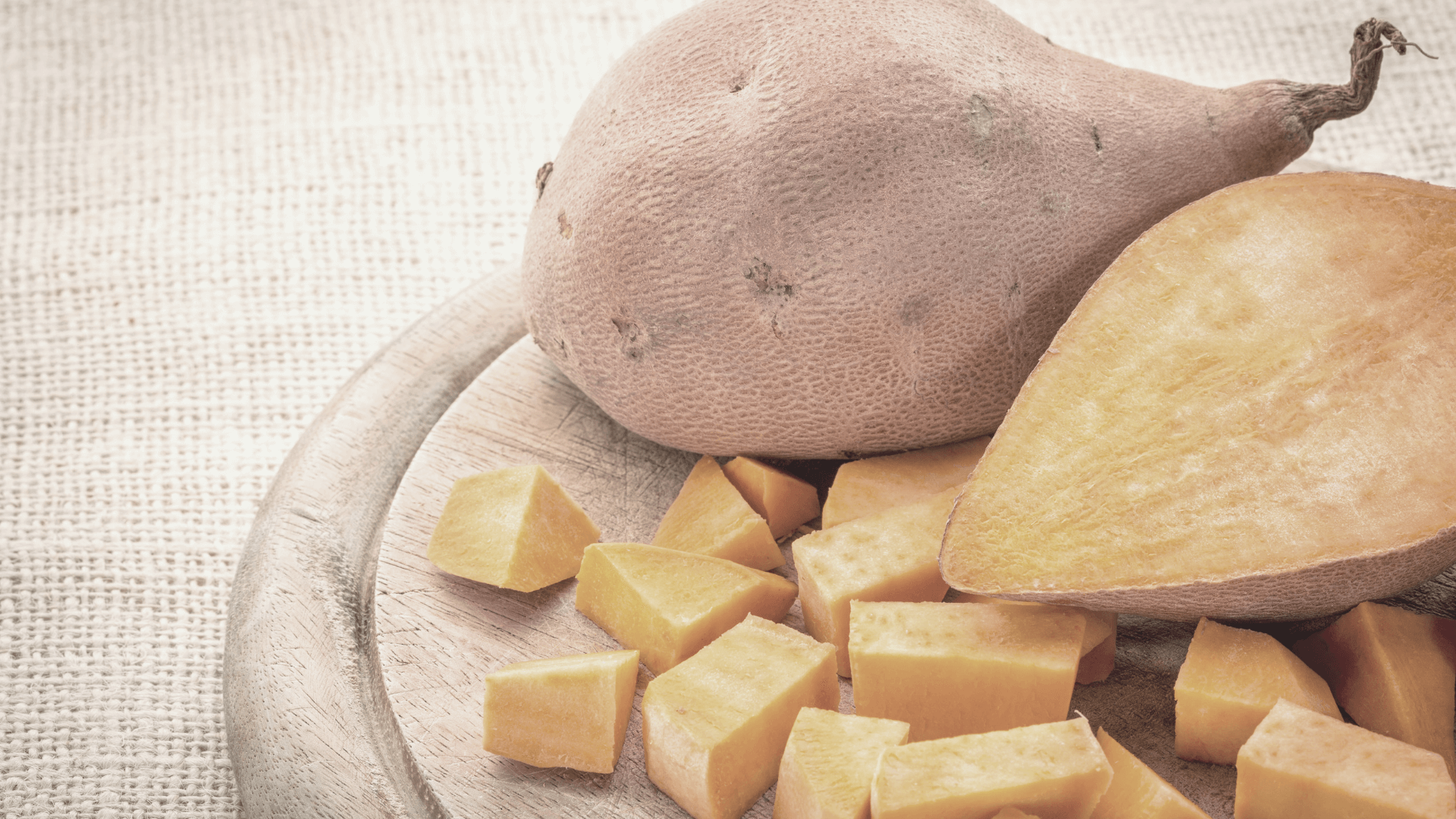What are the best digestive enzymes for bloating?
Well, in order to know, you first need to understand these 2 things:
- What are digestive enzymes?
- What is / causes bloating?
So let me help break it down today.
What are Digestive Enzymes
“Digestive enzymes” is a broad term that includes pancreatic enzymes, plant-derived enzymes and fungal-derived enzymes.
The body naturally produces them, but with age and health issues they decrease.
Some of these common health issues include:
- Cystic fibrosis
- Chronic pancreatitis (inflammation of the pancreas)
- Crohn’s disease
- Celiac disease
- Pancreatic cancer
Especially in those cases, having the necessary amount of enzymes is critical.
They help break down the foods eaten into nutrients, which increases absorption of nutrients. (This is essential because most key nutritional components are too complex for immediate absorption.)
Digestive enzymes help turn larger molecules found in foods (carbs, protein and fats) into more easily absorbed particles (such as amino acids, fatty acids, cholesterol, simple sugars and nucleic acids).
The body can then actually use these particles to function and for increased energy levels.
What Is Bloating?
First, remember that bloating and constipation are not the same things, even though they can occur simultaneously.
Bloating happens in the abdominal cavity (stomach).
It occurs when your gastrointestinal (GI) tract is partially or filled with air or gas. The gastrointestinal system extends from the mouth to the anus (bottom). It encompasses the entirety of your digestive system.
When bloated, you feel as if you have eaten a large meal and your stomach is full. It can be a source of discomfort or pain, and you might even physically notice that your stomach looks enlarged.
And yes, it may cause your garments to fit more snug.
Bloating makes your stomach feel full and constricted, most frequently due to gas.
Sources: HERE
Bloating Causes
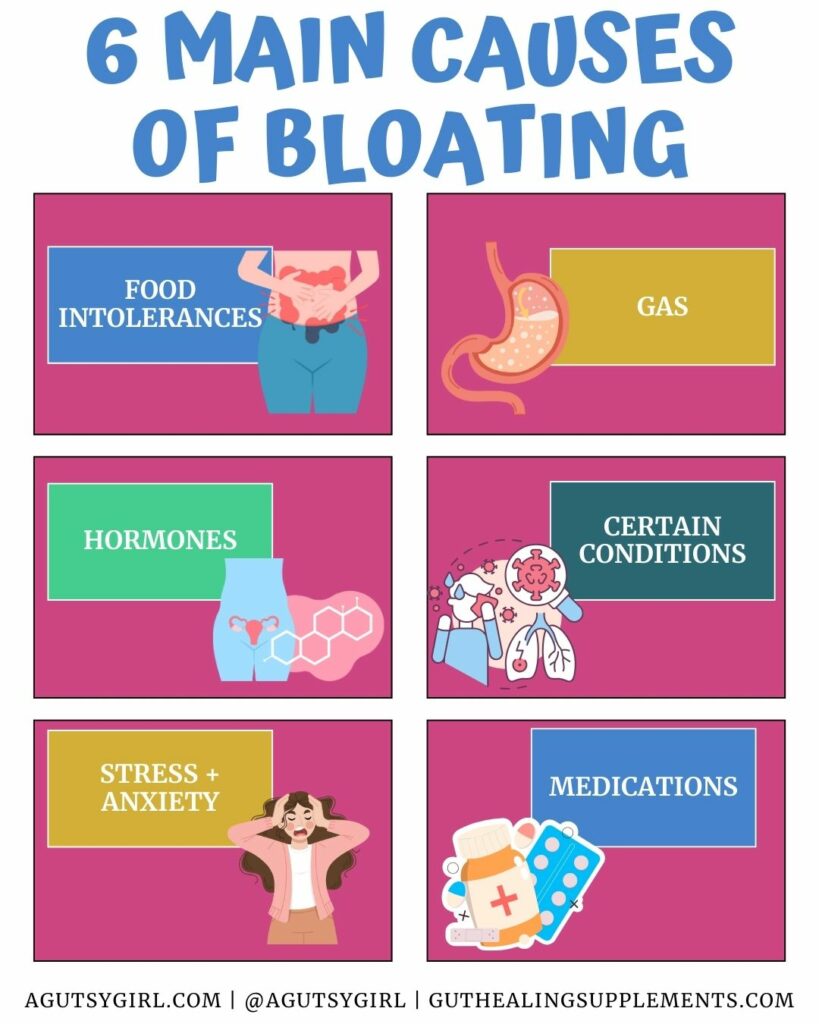
There are many different things that can cause bloating, but here are the main 6 I have found common with women in the Gutsy community:
Food Intolerances
Contrary to popular belief, food intolerances are not foods you are allergic to, but rather foods that cause inflammation in your body.
Oftentimes this occurs because your body lacks the proper digestive enzymes to break down certain nutrients, which leads to uncomfortable symptoms such as an upset stomach.
Food intolerances, or sensitivities, occur relatively quickly after eating a “trigger food.”
Food intolerances mostly affect the digestive system and symptoms occur as food struggles to be properly digested.
They commonly affect the IgG proteins in your body, which can promote that inflammatory response that is commonly seen. (source)
Some of the most common food intolerances include:
- dairy products (or lactose intolerance)
- gluten
- caffeine (COFFEE)
- histamine
- fructose
- food additives
- sulfites
- salicylates
- FODMAPs
These often cause symptoms such as abdominal discomfort, stomach pain, gas and bloating, and unusual bowel movements.
Gas
The side effects of producing too much gas can leave unwanted digestive systems like bloating.
Too much gas can be initiated by things like eating certain foods and consuming certain beverages like fizzy drinks (see above for common food intolerances) and using straws while drinking beverages.
Hormones
Bloating is very common before the start of your period and even during menopause.
High progesterone release may cause constipation, while prostaglandins often cause diarrhea. These are cyclical changes and can be normal, but sometimes we need a little extra gut support during these times.
In the reverse situation, poor gut health can also lead to an inability to make the proper hormones.
- poor nutrient absorption- decreases ability to make hormones such as estrogen and progesterone
- constipation- estrogen not being discarded, builds up in the body
- pathogens, gut bacteria- cause internal stress on the body and can impact ovulation
- bacteria dysbiosis- interferes with how body metabolizes estrogen
As you can see, different gut issues can cause HUGE issues hormonally across the body.
Hormones and gut health impact one another directly, you truly can not heal one without considering the other.
You can learn all about foods that cause bloating during your period and other hormonal shifts during this time HERE.
Certain Conditions
Bloating is often due to some sort of dysbiosis in the gut, or imbalance in the gut flora.
Since bacteria and yeasts feed on carbs to create gases in our bodies, they are often the cause of excessive gas production.
In order to get this imbalance under control, you often need to work with some sort of practitioner who specializes in gut health conditions.
Common dysbiosis issues include:
- SIBO (small intestine bacterial overgrowth)
- SIFO (small intestinal fungal overgrowth)
- parasitic infection
- mold exposure
These problems can take a long time to heal, but healing is entirely possible if done correctly.
Chronic inflammation is also another cause of bloating, which can be caused by a whole host of problems.
Stress + Anxiety
Mental health factors can cause bloating. So much so that doctors (even to this day) are prescribing anxiety medications for irritable bowel syndrome and bloating.
While I don’t believe this is the right approach to healing the problem, I absolutely believe that stress and anxiety can be contributing factors to bloating and digestive discomfort.
The most notable reason I believe this to be true is because stress reduces the body’s ability to produce natural digestive enzymes and decreases stomach acid.
In fact, Dr. Natasha Campbell (in her book, Gut and Psychology Syndrome) states,
GAPS people commonly have low stomach acidity due to abnormal gut flora and an overgrowth of pathogenic flora.
We cannot ignore this huge component which contributes to bloating.
Medications
While it’s never a good idea to stop taking any prescribed medication, it’s important to note that some medications can and do cause bloating.
Typically, these medications contain things like: acarbose, lactulose, or sorbitol.
Healthy Digestion
One more thing to understand is…..what actually happens during digestion in the gastrointestinal tract?
There are three phases of digestion that happen in the GI tract.
3 Phases of Digestion
Cephalic Phase
This is the oral phase, and it includes everything that happens in the mouth, esophagus (which is about 8 inches long), and pharynx.
Bolus, which is your partially digested food at this point travels via the pathways via peristalsis (which I’ve talked about many times before), and then enters the stomach for the next phase of digestion.
Gastric Phase
In the gastric phase, food hits the stomach (which can hold 2-4 L of liquid).
This is the place where pathogens and unwanted bacteria are killed. It’s also where gastric juices continue to break down food.
And a majority of protein is digested here.
Food, which was then bolus, is now chyme, and 2-3 teaspoons at a time filter into the small intestine.
Intestinal Phase
In this last phase, the intestinal phase, specific foods which contain carbs and fat are digested here.
Food travels through the small then large intestine and finally out through the rectum.
The 3 phases of digestion are quite the process, and that’s even considering that all of your pieces and parts are functioning at an optimal level.
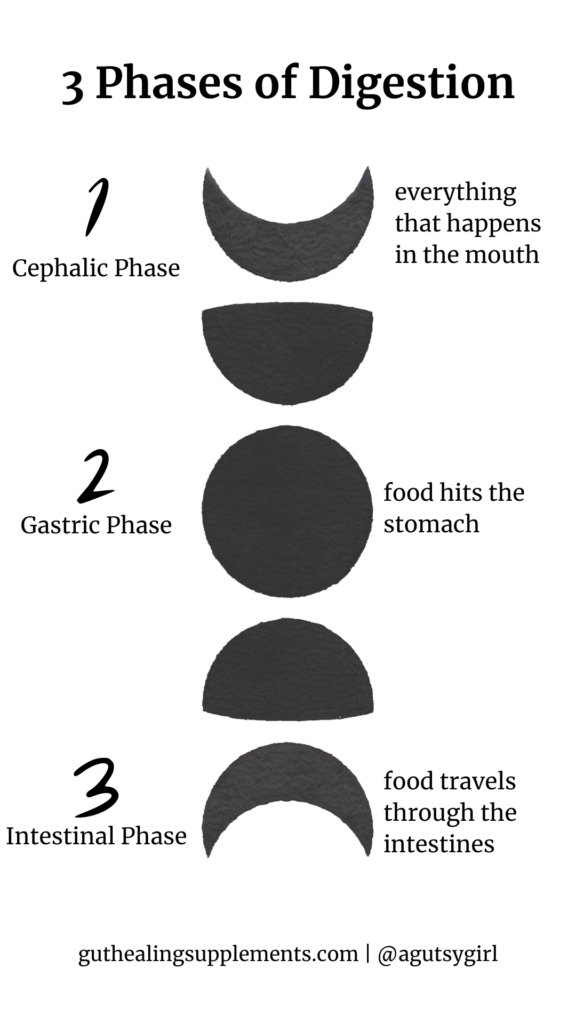
Mechanical and Chemical Digestion
What is the difference between mechanical and chemical digestion? And what are they even?
Mechanical Digestion
Mechanical digestion is the physical action of mashing food and breaking it into smaller parts.
Chewing your food is called mastication.
Peristalsis is the the wavelengths that push the food through the GI tract.
Chemical Digestion
Chemical digestion is the transformation of food into smaller molecules by digestive enzymes.
And here is where we talked all about the three main digestive enzymes: amylase, protease, and lipase.
But studying it now helped make it all so much more clear.
There are three things I’m more certain of now than ever before:
- We (me included) do not spend enough time chewing our food prior to swallowing it. For just one meal, try chewing each bite of food 20-30 times prior to swallowing. Make note after you’re done eating on anything you noticed. If you’ve never done it before, I’m guessing that list might be quite lengthy.
- Digestive enzymes – for the Gutsy women – are critical.
- If you have IBS and/or IBD something is definitely missing from either/both the mechanical and chemical pieces of your digestive process. Efficient digestion is not happening.
What are the Best Digestive Enzymes for Bloating
Click HERE to save this article on the best digestive enzymes for bloating for later.
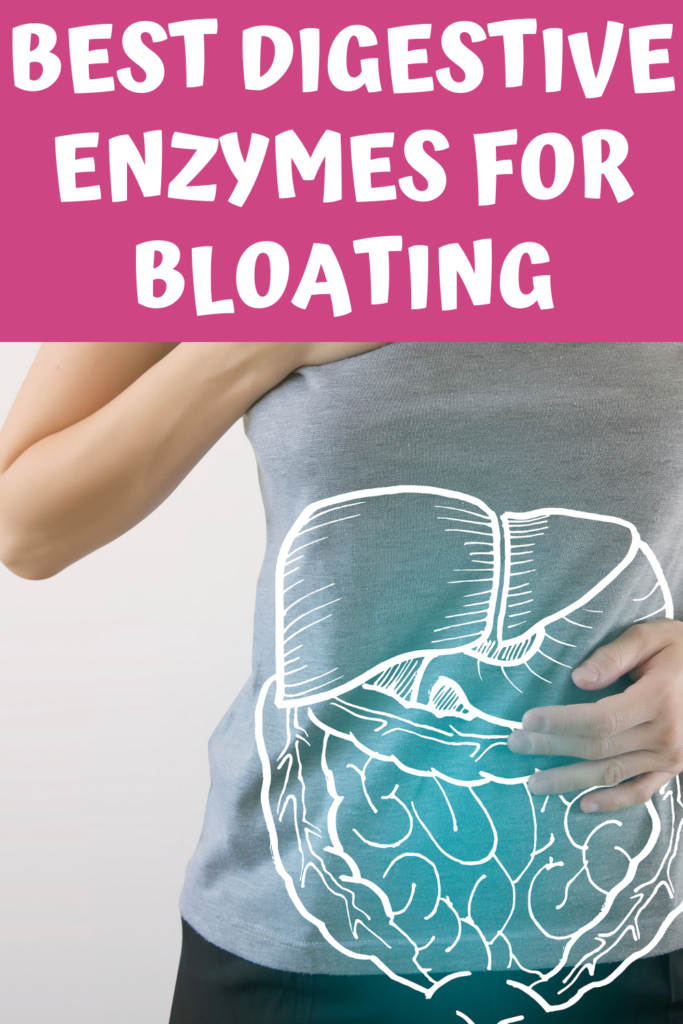
So now that we have the basic understanding of what digestive enzymes are and what things can contribute to bloating, we can go into more detail about the best digestive enzymes for bloating.
Like everything else I do with the people I work with (and how I navigated my own journey to no bloat, weight loss, and better overall health), we can work backwards.
So…..
- Understand the state of your own digestive health and what you are personally dealing with. You can do this in conjunction with your healthcare provider or registered dietitian, and/or you can start with some simple steps like keeping a food journal and/or trying an elimination diet. By the way, you can kill two birds with one stone and get both of these in my Quick Gut Detox Program.
- Make a list of the digestive symptoms that are unique to you.
- Review my list of the top 6 bloating causes, and drill down to the one(s) that you think are playing the biggest role in your body.
Then, consider that your digestive tract might just need a little extra help with digestive enzyme supplements.
Ingredients contained in digestive enzyme supplements
There could, literally, be anything contained in your enzyme supplement. Different digestive enzymes contain different formulas.
But here are some of the things you might find and what they are for.
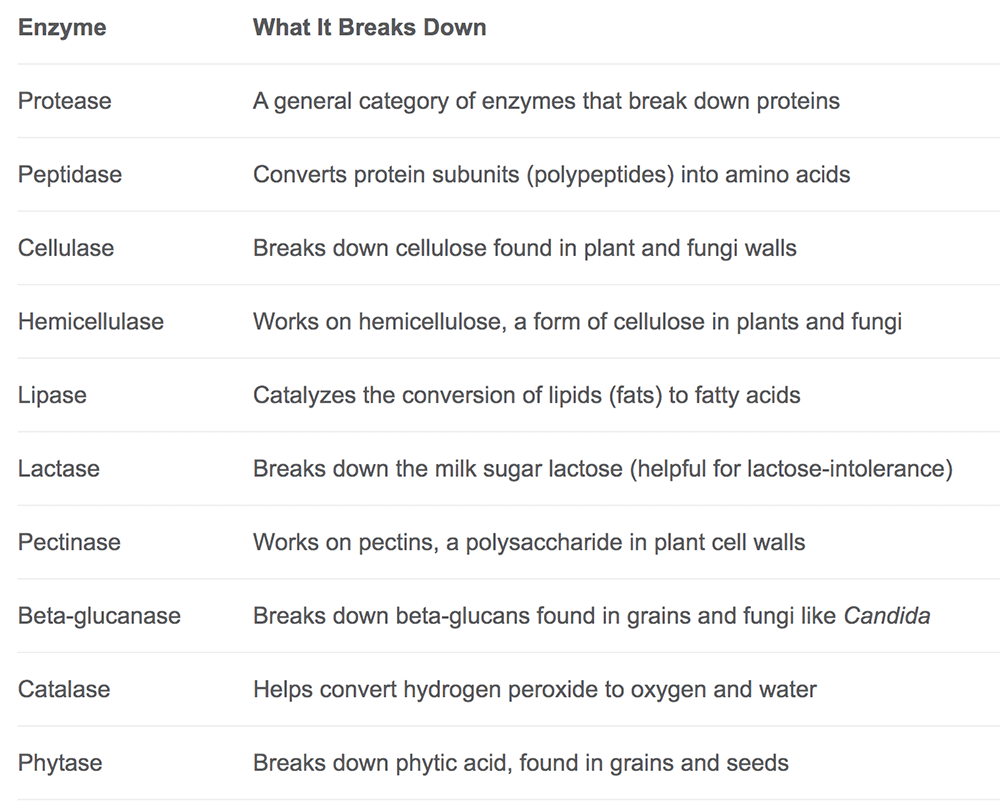
Other Digestive Enzyme Ingredients
AMYLASES
Amylases’ main function is to hydrolyze the glycosidic bonds in starch molecules, converting complex carbohydrates to simple sugars. (source)
BETAINE HCL
I’ve written about it in depth HERE
GLUCOAMYLASE
an important digestive enzyme that helps us absorb nutrients and create energy from some of the most common plant foods that we eat.
It does this by breaking down the starch that occurs naturally in most vegetables that we eat.
INVERTASE
an enzyme that catalyzes the hydrolysis (breakdown) of sucrose (table sugar) into fructose and glucose
OX BILE
acts as a detergent to make the fat in food more soluble and therefore easier to digest
PEPSIN COMPLEX
an endopeptidase that breaks down proteins into smaller peptides (oftentimes found in HCL aka HCL with Pepsin)
What to look for in a digestive enzyme supplement?
First, let it be clearly stated,
Enzyme supplementation therapy may play an important role in several digestive and malabsorption disorders, such as EPI and lactose intolerance. (source)
However, it’s hard to know the exact digestive enzyme you might need without knowing your specific situation.
That said, digestive enzymes are broken down into three classes:
- lipases (needed to digest fat)
- proteolytic enzymes (needed to digest protein)
- amylases (needed to digest carbohydrates)
And these three things are critical in your enzyme.
Any digestive enzyme I’ve ever taken contained them.
Units of Measurement for Digestive Enzymes
There are different ways digestive enzymes show the amount of ingredient contained.
Here is a good place to start for reference:

Additionally, you might see:
- Cellulase – CU (Cellulase unit)
- Invertase – IAU (Invertase Activity unit)
- Lactase – LacU (Lactase unit)
- Maltase – DP (degrees Diastatic power)
- Mg – a common unit of measurement
The Best Digest Enzyme Supplement
This is subjective because, again, “best” is highly unique to certain medical conditions and the individual.
However, my preferred digestive enzyme for most digestive issues is Break Down. This is the digestive enzyme from A Gutsy Girl’s supplement line.
Break Down is a comprehensive formula designed to support optimal digestion and absorption of essential nutrients.
This unique formula contains a proprietary blend of digestive enzymes and betaine hydrochloride (HCl) to support the breakdown of proteins, fats, and carbohydrates.
It also contains the enzyme lactase to break down lactose in dairy products.
If you struggle with gas, bloating, constipation or feeling full after only a small meal, Break Down is the perfect choice for you.
You can see the FULL list of Break Down ingredients HERE.
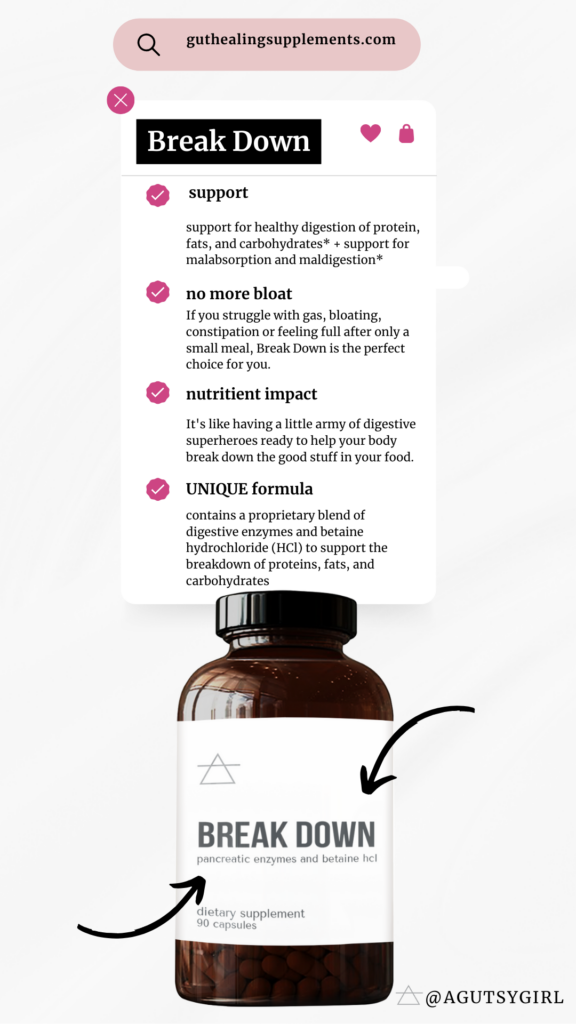
I have been on many different products and this enzyme really helps. I was on a prescription digestive enzyme for about a year and a half and was not thrilled with the results. I stayed on it cause it was prescription and it was recommended as the best option for me since I tried everything else. I read the side effects and decided I didn’t want a possible bowel blockage and decided to give these enzymes a try. I take them with every meal and haven’t had any issues with digestion since. I would recommend these to everyone. Super thrilled that A Gutsy Girl supports these products because they really work. – Debbie
Prescription Enzymes
There are also prescription enzyme medications. They contain pancrelipase, a mixture of the digestive enzymes amylase, lipase, and protease.
Prescription enzymes also contain a special coating on the pill so it will survive stomach acid and make it to the small intestine.
These prescriptions include:
- Creon
- Pancreaze
- Pertzye
- Ultresa
- Viokace
- Zenpep
These prescriptions are typically made from the pancreases of pigs, and are regulated and approved by the FDA.
But by the way, that’s not to say that non-prescription ones don’t and won’t survive. I’ve never taken a prescription enzyme, and still thrive!
Recap: Digestive Enzymes Dietary Supplements to Reduce Bloating
I’ve heard it all when it comes to digestive enzymes from “there is little evidence to support the use of digestive enzymes” to “the use of digestive enzymes seemingly solved all my digestive problems.”
I lean more towards the latter because they helped me immensely.
If you’re experiencing GI symptoms and can relate to the information in this article, you might consider supplemental digestive enzymes.
I will never tell you that a digestive enzyme is going to solve all your problems because I firmly believe that the use of digestive enzyme products is a strategy to employ in conjunction with many other things (key dietary changes, lifestyle swaps, proper diagnosis, etc. – you know, my 3 pillars to ultimate gut healing).
However, if you’ve never considered digestive enzymes supplements and are looking for less bloat and better digestion, they can provide additional digestive support.
And at the end of the day, if something helps us find more relief through less bloat and reduced abdominal pain, I’m sure you’d agree that it’s worth considering!
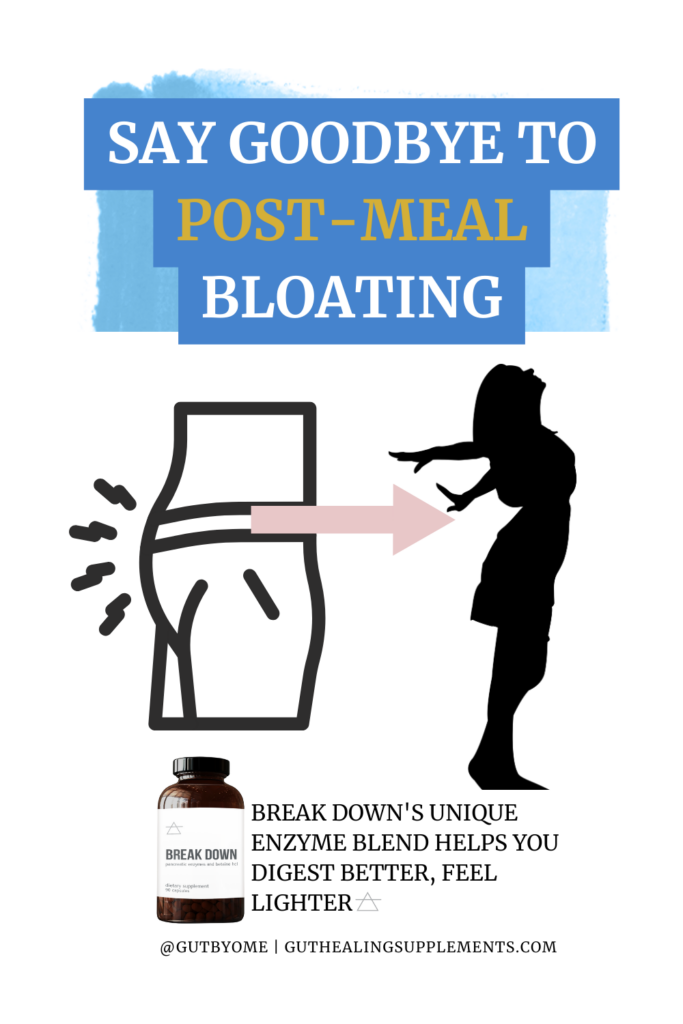
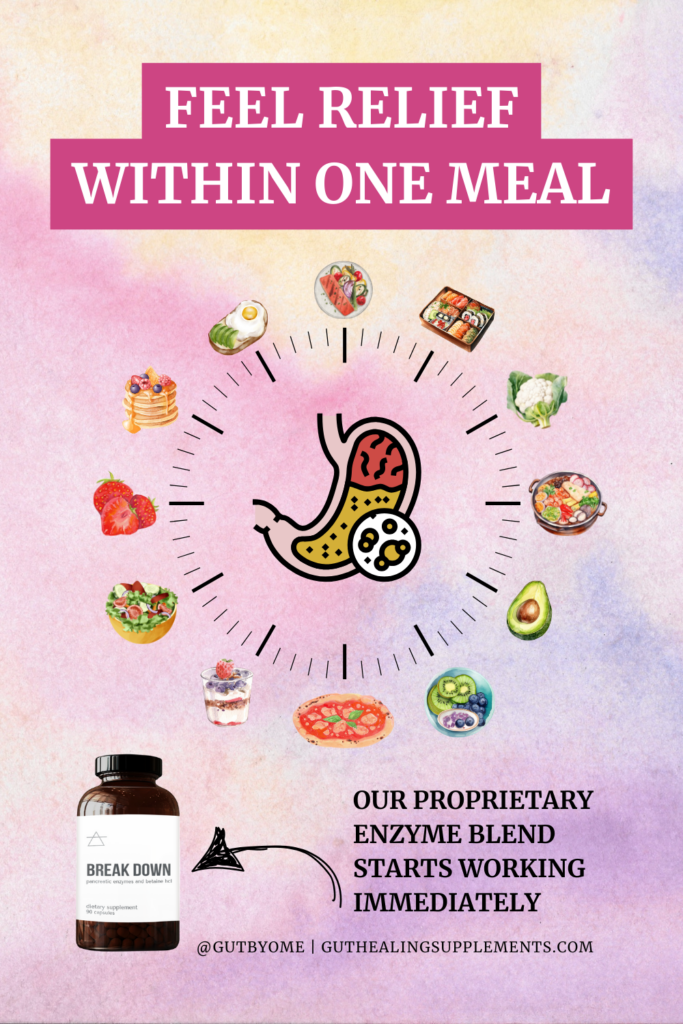

If you liked this post, you might also enjoy:
Xox,
SKH
🤰 bloating be gone! weight loss through optimal gut health for women
💃ʜᴇᴀʟ ʏᴏᴜʀ ɢᴜᴛ. ʜᴇᴀʟ ʏᴏᴜʀ ʟɪfe.
🫶🏻 founder gutbyome.com

